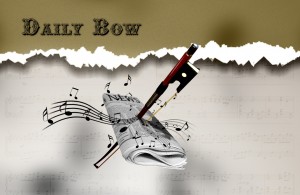
For many people – especially Americans – Cuba remains much of a mystery. The closed-off island has some kind of powerful allure to those who are unable to visit it easily. But some Cubans are intent on showing the rest of the world that they are interested in building relations… and that half a century of isolation hasn’t dulled their musical chops!
For the first time since 1959, Cuban musicians played alongside their American counterparts in the United States… and it happened right where I grew up in Washington State!
(Yesterday) Monday, seven classical musicians from the Orquesta de Cámara Concierto Sur had made the journey and were rehearsing Beethoven with musicians from Tacoma’s Northwest Sinfonietta.
It’s the first time Cuban musicians have played side by side with an American orchestra in the United States since the 1959 Cuban Revolution, and it’s the reciprocation of the Sinfonietta’s visit to Cuba in January.
It’s also the start of a cultural festival at two local universities, and proof that music can bridge political and linguistic borders.
“This is a truly historical moment in the relationship between our two nations,” said Sinfonietta director Christophe Chagnard, who will conduct the group’s three concerts this weekend in Seattle, Tacoma and Puyallup. “This shows that music has the capacity to transcend ideology. … It’s because of music that they’re here.”
“It’s a great experience being here in the States,” said Emiliya Victorovna Bondarenko, the Russian-born musical director and concertmaster of the Cuban chamber orchestra, which is based at the Teatro Tomás Terry. “It’s a good thing that American and Cuban musicians can get together. We give the Sinfonietta supporters our warmest thanks.”
Monday’s rehearsal was a combination of laughter and hugs, as Tacoma musicians reunited with friends they’d made last January, and sheer hard work practising the fast and furious notes of Beethoven’s Symphony No. 9 for the weekend’s concerts.
None of the seven Cuban musicians had ever played the work – it requires many more musicians and instruments than Cienfuegos’ chamber-size group – and the three lilting Spanish dances of Cuban composer Ernesto Lecuona, which will share the program, seemed equally unfamiliar to the 35-member Tacoma orchestra.
As the author writes, this visit goes deeper than just music. It is quite an amazing opportunity for both us and the Cubans. Since our exposure to Cuba is so limited and filtered through specific channels, American musicians have the incredible chance to talk and share experiences with people intimately familiar with life on the island… people who are able to put some of what we hear in a realistic perspective. For the Cubans, they have a lot planned during their time in the US. They are attending a festival of master classes and concerts at the University of Washington, Tacoma and the University of Puget Sound (my Alma Mater, also in Tacoma). They also get time for sightseeing and fun while in the Tacoma-Seattle area before heading off to Arizona for another combined concert.
It seems fateful that this should hit the news this week as just the other day I was discussing the very issue of Cuba. Because of the embargo, it is extremely difficult for Americans to travel to Cuba (not the case for most other nationalities). However, one person raised the issue that visiting there is in someways very bad, because tourists who go there take advantage of people who are far less fortunate than them. Since the country is closed off for longstanding political and ideological reasons, going there to capitalize on cheap vacation could be considered opportunistic. On the flip side, that same argument could be made for most underdeveloped countries whose political and system and societal structure is unlike ours (e.g. many countries in Sub-Saharan Africa, Southeast Asia, and Latin America). When you consider that tourism can bring in a degree of economic development, that “opportunism” can also be considered a form of pseudo-philanthropy, though you are obviously getting something in return.
But whatever the realities are between the governments of America and Cuba, I’m happy to see that this didn’t stop musicians on both sides from making the successful attempt to bridge the divide. Often the sentiments of governments are not reflected the same way in the hearts and minds of the people. I hope that this is the start of many more exchanges in the future… and that our two governments takes note of the hard work being done and the fruit it is bearing.
Read the full story – Cuban classical musicians play side by side with Northwest Sinfonietta, then at Tacoma festival














No comments yet.